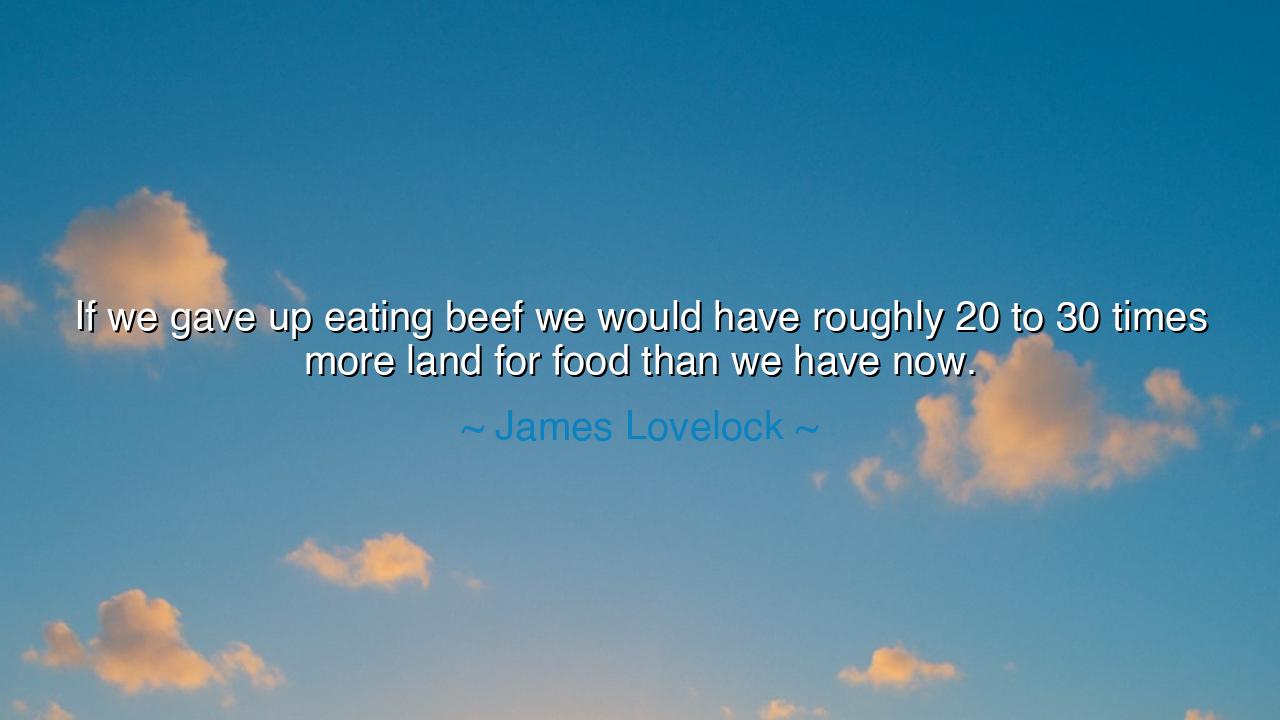
If we gave up eating beef we would have roughly 20 to 30 times
If we gave up eating beef we would have roughly 20 to 30 times more land for food than we have now.






In the councils of old it was said: count not only your coins, but also your acres, for the earth is the first ledger. So when James Lovelock declares, “If we gave up eating beef we would have roughly 20 to 30 times more land for food than we have now,” he speaks in the arithmetic of fields and rain. He names a stark exchange: the wide reach of cattle for pasture and feed, measured against the modest needs of roots and grains that could nourish multitudes. His claim is not a rebuke of hunger, but a summons to prudence—asking whether our appetites are worthy of the territory they command.
To hear the sense behind the number, imagine the pyramid of land that stands beneath a single steak. Grasslands first, then the cropland for feed, then the water and fences, the transport and cooling—a whole procession of inputs marching toward one plate. In contrast, many plant foods ask the earth far less: a smaller field, a shorter season, a lighter hand on water. Thus the old proverb returns with new clarity: what we choose to chew decides what becomes of valleys and hills. When beef sits at the center, the countryside rearranges itself around hooves; when plants sit there, space is released for gardens, forests, and rivers to breathe again.
History offers a parable from the Amazon’s edge. There, in living memory, forests once thick with macaw light and medicinal shadows were felled for pasture and soy—much of the soy not for people’s bowls, but for troughs. Villages gained quick cash; the world lost long shelter. Rains wandered, soils tired, fires learned new paths. The lesson is not that herders are villains; it is that the ratio of land to meal matters. If we tilt our diets, even partly, the forest can be invited back to the table—no sermon required, only different market signals carried by our forks.
Another story travels from a small, rain-hungry nation that chose to mend its hills. Terraces rose, trees returned, and farmers planted legumes and grains for people first. Where herds once sprawled thinly across eroding slopes, smaller, better-managed animals and more plant crops fed more mouths from less ground. Springs woke; children walked shorter to water; the green season grew longer. This was not ideology but stewardship: a people learning to match their hunger to their habitat.
Lovelock’s sentence, heavy with 20 to 30 times, can tempt us toward absolutes. Wisdom counsels balance. Not all beef is the same; not all soils should be plowed. Some landscapes thrive as pasture—steep, stony, or arid lands where ruminants, tended well, turn rough grasses into nourishment and cycle soil fertility. The elder rule is not “never,” but “fit”: animals where they heal, plants where they spare, and always an eye on the footprints we leave upon the watershed and the wind.
From this saying, take a clear lesson: scale your appetite to the earth that must answer it. If you would free land for food, forests, and future rain, begin with the plate. Shift the center from hooves to harvests—more beans and grains, more roots and fruits, fewer meals that demand acres upon acres for a single bite. Do this not as a theater of virtue, but as a quiet recalculation that returns room to the living world and resilience to your own community.
Let counsel become practice. Mark a few days each week as “acre-light,” where beef is set aside for dishes that multiply abundance—stews of lentil and barley, breads and greens, orchards on the tongue. When you do choose meat, seek herds that heal—regenerative, local, transparent—so your money votes for pasture that keeps soil and stream. Support policies that reward farmers for restoring tree lines and wetlands, and for growing food for people before feed for troughs. Teach children this gentler math with gardens and maps: here is the field that fed us tonight, and here is the forest that stands because we asked less of it. In these small shifts the great number Lovelock names begins to take on flesh, and the land remembers our kindness.






AAdministratorAdministrator
Welcome, honored guests. Please leave a comment, we will respond soon